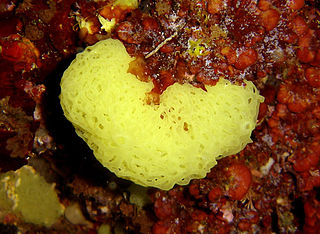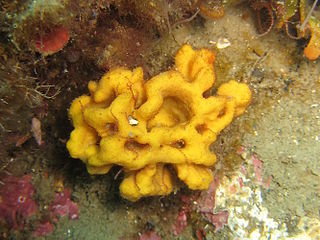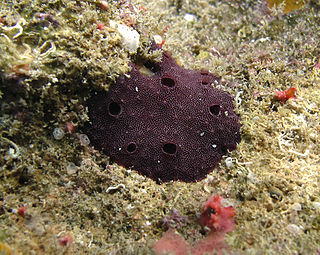
Clathrina is a genus of calcareous sponge in the family Clathrinidae. Several species formerly in Clathrina were transferred to the newly erected genera Arturia, Ernstia, Borojevia, and Brattegardia in 2013. The name is derived from the Latin word "clathratus" meaning "latticed".

Geodia is a genus of sea sponge belonging to the family Geodiidae. It is the type genus of its taxonomic family.

Spongia is a genus of marine sponges in the family Spongiidae, originally described by Carl Linnaeus in 1759, containing more than 60 species. Some species, including Spongia officinalis, are used as cleaning tools, but have mostly been replaced in that use by synthetic or plant material.

Plakinidae is a family of marine sponges. It is composed of seven genera:

Axinella is a genus of sponges in the family Axinellidae first described in 1862 by Eduard Oscar Schmidt. Species of Axinella occur in the Indian and Pacific Oceans. Most of these sponges are smaller than 20 cm, and have a yellow or orange colour.
Hymeniacidon is a genus of sea sponges in the class Demospongiae. Some members of the genus are known to be mobile, achieving speeds of between 1 and 4 mm per day.

Stelletta is a genus of sea sponges belonging to the family Ancorinidae.

Tethya is a genus of sea sponges belonging to the family Tethyidae. Members of this genus all have a spherical body form and some are known to be able to move at speeds of between 1 and 4 mm per day.

Clathria is a large genus of demosponges in the family Microcionidae.
Biemna is a genus of sea sponges in the family Biemnidae.

Haliclona is a genus of demosponges in the family Chalinidae.

Darwinellidae is a family of sponges in the order Dendroceratida.

Callyspongia is a genus of demosponges in the family Callyspongiidae.

Cinachyrella is a genus of marine sponges in the family Tetillidae. A number of Cinachyra species have been moved into Cinachyrella.

Gelliodes is a genus of sponges in the family Niphatidae.

Craniella is a genus of marine sponges in the family Tetillidae.

Tedania is a genus of sea sponges in the family Tedaniidae.

Mycale is a genus of demosponge with 240 recognised species in 11 subgenera. It has been a large genus with multiple subdivisions since it was first described in 1867.
Amorphinopsis is a genus of sea sponges belonging to the family Halichondriidae.

Dysidea is a genus of sponges belonging to the family Dysideidae.

















